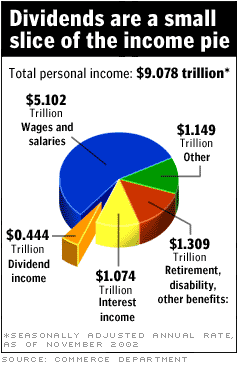NEW YORK (CNN/Money) -
The Senate's decision to zap hundreds of billions of dollars from President Bush's tax-cut proposal is either a blessing or a curse to the economy, depending on which economist you ask.
Though Federal Reserve Chairman Alan Greenspan has said any decision about the plan should wait until after the war with Iraq is over, Congress probably will not wait that long, not with the 2004 election looming on the horizon.
"If you're sitting in Congress, your perspective is that you need to get a growth package through with sustained tax relief to boost job growth and get the economy back to potential faster," said John Kitchen, chief economist for the House Committee on Budget. "Sitting back and waiting is not a viable option."

By a 51-48 vote Tuesday, the Senate decided to cut the size of Bush's tax-cut plan to $350 billion, less than half the $726 billion Bush proposed. Budget concerns seemed to inspire the decision, since it came on the same day Bush asked Congress for $75 billion to cover the expense of the U.S.-led war with Iraq.
The House of Representatives already had voted in favor of the full Bush tax plan, so a House-Senate conference committee will meet in the next several days to work out a compromise.
The Bush proposal includes wiping out personal taxes on most dividend income and would accelerate and make permanent cuts in individual income-tax rates that were supposed to take effect in future years, but be taken away again in 2010.
Though it's unclear where the Senate made its cuts, many economists think the dividend-tax elimination is the part of the plan most likely to be voted off the island, since it's been the most politically controversial.
Economists in favor of the Bush plan warned its short-term stimulative effects could be reduced if it's cut in half, depending on how much of the plan ends up on the cutting-room floor and what parts of it shrink or disappear.
Brian Wesbury, chief economist at Griffin Kubik Stephens & Thompson, a Chicago investment banking firm, and one of the 115 economists who signed a statement in February supporting the Bush plan, said he thinks cutting tax rates could add 0.5 percentage point to GDP growth per year, while cutting the dividend tax could add another 0.5 percentage point.
"Any reduction is going to take away from my forecast of any boosted growth," Wesbury said.
Of course, according to this view, half a tax cut is at least better than no tax cut at all -- Wesbury thinks gross domestic product (GDP), the broadest measure of the economy, still could get a 0.5 percentage-point boost in 2003, even if the dividend cut is eliminated.
Wesbury and other supporters of the Bush plan think eliminating the dividend tax will boost stock prices, increasing the wealth of households and encouraging consumer spending, which makes up more than two-thirds of GDP.
Higher consumer demand, coupled with higher stock prices, would encourage businesses to invest and hire new workers, according to this view, ending a long jobless recovery from the recession that began in 2001 and resulted in nearly 2 million job cuts.
| Related stories
|

|
|
|
|
Other economists -- including the 400 who signed their own statement in February opposing the Bush plan -- aren't so sure about that. Many of them likely would think the Senate's trimming $300 billion or so from the plan would be good for the economy, especially if it comes from the dividend cut, which they think is of dubious economic benefit while helping to balloon federal budget deficits.
"I don't think any benefit of the dividend tax elimination is worth the increase in the deficit," said Lacy Hunt, chief economist at Hoisington Investment Management in Austin, Texas.
Even before Bush asked Congress for $75 billion to fund the war, the White House expected budget deficits of record dollar amounts in 2003 and 2004. Some economists think deficits are acceptable if they fuel greater economic growth, which will raise tax revenue and eliminate future deficits.
Others aren't so sure, worrying that the government will have to borrow to finance the deficits, sucking money from the private sector and driving up interest rates, while offering little economic benefit.
"In the past two years, we've seen the budget go from surplus to deficit, adding about $400 billion of stimulus to the economy, but we've still lost 2.5 million private-sector jobs," Hunt said.

|

